286 scholarly books by Haus Publishing and 14
start with W
286 scholarly books by Haus Publishing and 14
286 scholarly books by Haus Publishing
14 start with W start with W
14 start with W start with W
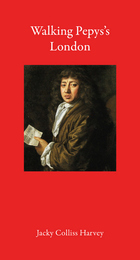
Walking Pepys's London
Jacky Colliss Harvey
Haus Publishing, 2022
Brings to life the world of Samuel Pepys with five walks through London.
Samuel Pepys, the seventeenth century's best-known diarist, walked around London for miles, chronicling these walks in his diary. He made the two-and-a-half-mile trek to Whitehall from his house near the Tower of London on an almost daily basis. These streets, where many of his professional conversations took place while walking, became for him an alternative to his office.
With Walking Pepys’s London, we come to know life in London from the pavement up and see its streets from the perspective of this renowned diarist. The city was a key character in Pepys’s life, and this book draws parallels between his experience of seventeenth-century London and the lives of Londoners today. Bringing together geography, biography, and history, Jacky Colliss Harvey reconstructs the sensory and emotional experience of Pepys’s time. Full of fascinating details, Walking Pepys’s London is a sensitive exploration into the places that made the greatest English diarist of all time.
Samuel Pepys, the seventeenth century's best-known diarist, walked around London for miles, chronicling these walks in his diary. He made the two-and-a-half-mile trek to Whitehall from his house near the Tower of London on an almost daily basis. These streets, where many of his professional conversations took place while walking, became for him an alternative to his office.
With Walking Pepys’s London, we come to know life in London from the pavement up and see its streets from the perspective of this renowned diarist. The city was a key character in Pepys’s life, and this book draws parallels between his experience of seventeenth-century London and the lives of Londoners today. Bringing together geography, biography, and history, Jacky Colliss Harvey reconstructs the sensory and emotional experience of Pepys’s time. Full of fascinating details, Walking Pepys’s London is a sensitive exploration into the places that made the greatest English diarist of all time.
[more]
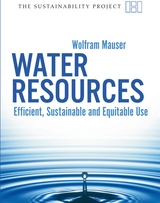
Water Resources
Efficient, Sustainable and Equitable Use
Wolfram Mauser
Haus Publishing, 2008
Water is a vital part of every ecosystem on the planet. It is a prerequisite for the basic function and productive efficiency of life on Earth. Today, approximately a third of the earth's population suffers because of water scarcity, and by the year 2025, this percentage is likely rise to two-thirds. Water Resources: Efficient, Sustainable and Equitable Use shows what conflicts this will entail, and provides a basis for possible solutions.
[more]
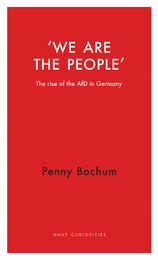
We are the People
The Rise of the AfD in Germany
Penny Bochum
Haus Publishing, 2020
Recent years have seen a surge of populism across the Western world, exposing the vulnerabilities of liberal democracy and driving the international political agenda to the right. In Germany in 2017 the recently founded far-right populist party—the Alternative for Germany (AfD)—swept into the Bundestag, claiming to be the voice of the people against a corrupt liberal elite and overturning the delicate postwar political consensus in Germany.
We are the People analyzes the sudden growth and radicalization of the AfD, from its Euroskeptic beginnings in 2013 to its increasing extremism. Penny Bochum shows us how the leaders’ use of inflammatory, xenophobic, and even Nazi-era language mirrors that of emerging far-right forces across much of the Western world. At the same time, through a lucid examination of the group’s ideology, Bochum shows how their brand of populism is distinct and based on German experiences and history.
We are the People analyzes the sudden growth and radicalization of the AfD, from its Euroskeptic beginnings in 2013 to its increasing extremism. Penny Bochum shows us how the leaders’ use of inflammatory, xenophobic, and even Nazi-era language mirrors that of emerging far-right forces across much of the Western world. At the same time, through a lucid examination of the group’s ideology, Bochum shows how their brand of populism is distinct and based on German experiences and history.
[more]
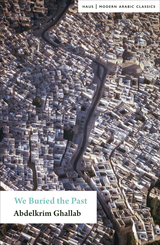
We Have Buried the Past
Abdelkrim Ghallab
Haus Publishing, 2018
Abdelkrim Ghallab’s postcolonial We Buried the Past, originally published in 1966, was the first breakthrough Moroccan novel written in Arabic instead of French. Newly translated into English, this edition brings Ghallab’s most widely read and lauded work to a new audience.
Written after the country gained independence, the historical novel follows two generations of al-Tihamis, a well-to-do family residing in Fez’s ancient medina. The family members’ lives reflect the profound social changes taking place in Morocco during that time. Bridging two worlds, We Buried the Past begins during the quieter days of the late colonial period, a world of seemingly timeless tradition, in which the patriarch, al-Haj Muhammad, proudly presides over the family. Here, religion is unquestioned and permeates all aspects of daily life. But the coming upheaval and imminent social transition are reflected in al-Haj’s three sons, particularly his second son, Abderrahman, who eventually defies his father and comes to symbolize the break between the old ways and the new.
Noted for marrying classical Arabic style and European literary form, this book also offers insight into the life of Ghallab himself, who was deeply involved in the nationalist movement that led to Moroccan independence. A pioneering work, We Buried the Past beautifully characterizes an influential period in the history of Morocco.
Written after the country gained independence, the historical novel follows two generations of al-Tihamis, a well-to-do family residing in Fez’s ancient medina. The family members’ lives reflect the profound social changes taking place in Morocco during that time. Bridging two worlds, We Buried the Past begins during the quieter days of the late colonial period, a world of seemingly timeless tradition, in which the patriarch, al-Haj Muhammad, proudly presides over the family. Here, religion is unquestioned and permeates all aspects of daily life. But the coming upheaval and imminent social transition are reflected in al-Haj’s three sons, particularly his second son, Abderrahman, who eventually defies his father and comes to symbolize the break between the old ways and the new.
Noted for marrying classical Arabic style and European literary form, this book also offers insight into the life of Ghallab himself, who was deeply involved in the nationalist movement that led to Moroccan independence. A pioneering work, We Buried the Past beautifully characterizes an influential period in the history of Morocco.
[more]
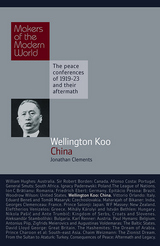
Wellington Koo
China
Jonathan Clements
Haus Publishing, 2010
Gu Weijun, a.k.a. Wellington Koo (1887-1985). Born in Shanghai and raised in the city's International Settlement, Koo became fluent in English during his postgraduate studies abroad - he got a PhD in Law from Columbia in 1912. He was recalled soon afterwards to become the English Secretary to the newly formed Republic of China, and became ambassador to the United States in 1915. He achieved notoriety at the Paris Peace Conference where he sternly resisted Japanese attempts to hold onto seized German colonial territory in mainland China. In protest at their treatment, the Chinese were the only delegates not to sign the subsequent Treaty of Versailles. Koo was China's first representative to the League of Nations, and ended up as acting president of Republican China during the unrest of the period 1926-7. He subsequently served briefly as a Foreign Minister during the peak of the Warlord Era, before returning to Europe, first as a delegate at the League of Nations, and then as China's ambassador to France. With the Nazi occupation, Koo fled to Britain, where he became the Chinese ambassador to the UK until 1946. A founder member of the United Nations, Koo was instrumental in maintaining the position of Republican China on the Security Council -by this time, 'Republican China' was limited solely to the island of Taiwan, while the Communists proclaimed themselves to be the new rulers of China itself. Retiring from the diplomatic service in 1956, the venerable Koo went on to become a judge at the International Court of Justice at the Hague, rising to vice-president before his retirement, aged 80, in 1967. He settled in New York, where his final years were tormented by 'Republican' China's loss of its seat on the United Nations Security Council to the Communists, following Nixon's famous visit to China.
[more]
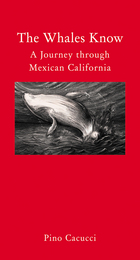
The Whales Know
A Journey through Mexican California
Pino Cacucci
Haus Publishing, 2014
Following in the footsteps of John Steinbeck, Cacucci travels through endless expanses of desert, salt mountains and rows of cacti with thorns so sharp that they can impale thirsty birds... Written with humour and heart, this is an insight into an ecosystem under threat and he describes the landscape and its inhabitants with compassion and respect.
[more]
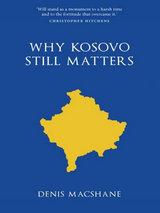
Why Kosovo Matters
Denis MacShane
Haus Publishing, 2011
A short polemical appeal by Dennis MacShane (Minister for Europe 2005-2010) for policy-makers to re-engage with the Western Balkans before it is too late. Drawing on his experience as a Minister for the Balkans between 2001-2010, MacShane has written a vivid and forceful account, showing that the Western Balkans are a symbol of Europe's weakness to transform one of its key regions and the choice is now stark: either the Balkans become Europeanised or Europe becomes Balkanised.
[more]
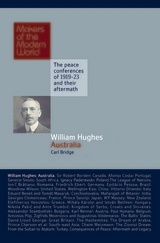
William Hughes
Australia
Carl Bridge
Haus Publishing, 2010
The First World War marked the emergence of the Dominions on the world stage as independent nations, none more so than Australia. The country's sacrifice at Gallipoli in 1915, and the splendid combat record of Australian troops on the Western Front not only created a national awakening at home, but also put Great Britain in their debt, ensuring them greater influence at the Peace Conferences. Australia was represented at Versailles by the Prime Minister, the colourful Billy Hughes, whom Woodrow Wilson called 'a pestiferous varmint' after their repeated clashes over Australia's claims to the Pacific Islands its troops had taken from Germany during the War. Hughes was also the most vociferous (though by no means at all the only) opponent of the racial equality clause put forward by Japan. Indeed, it was fear of Japanese expansion that drove Australia's territorial demands in the Pacific.
[more]
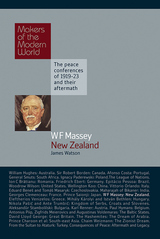
William Massey
New Zealand
James Watson
Haus Publishing, 2010
The Great War profoundly affected both New Zealand and its Prime Minister William Massey (1856-1925). 'Farmer Bill' oversaw the despatch of a hundred thousand New Zealanders, including his own sons, to Middle Eastern and European battlefields. In 1919 he led the New Zealand delegation to the Paris Peace Conference, where it was represented both in its own right and as part of the British Empire. This symbolised its staunch loyalty to Empire and the fact that it had its own particular interests. Massey was largely satisfied with the Versailles Treaty, as New Zealand gained a mandate over Western Samoa, Germany forfeited its other Pacific colonies, and control over Nauru's valuable phosphate deposits was shared between Britain, Australia and New Zealand, rather than simply being given to Australia. He believed that the apparent confirmation of British power improved New Zealand's security, and had little faith in the League of Nations. However, the opposition Labour Party came to believe the League could prevent a major war and made that a cornerstone of their foreign policy in government after 1935. Their belief that Versailles was unfair to Germany partly influenced them to favour negotiations with Hitler even after the outbreak of war in 1939.
[more]
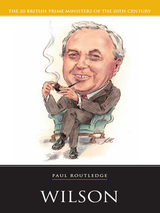
Wilson
Paul Routledge
Haus Publishing, 2006
Harold Wilson held out the promise of technology and of 'the Britain that is going to be forged in the white heat of this revolution'. A balance of payment crisis, leading to devaluation in 1967, frustrated the fulfilment of his primeministerial promises. Meanwhile foreign affaris were dominated by the issue of Rhodesia, in which Wilson took a personal initiative in diplomacy with Ian Smith but failed to make any progress.
[more]
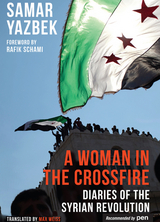
A Woman in the Crossfire
Diaries of the Syrian Revolution
Samar Yazbek
Haus Publishing, 2012
A well-known novelist and journalist from the coastal city of Jableh, Samar Yazbek witnessed the beginning four months of the uprising first-hand and actively participated in a variety of public actions and budding social movements. Throughout this period she kept a diary of personal reflections on, and observations of, this historic time. Because of the outspoken views she published in print and online, Yazbek quickly attracted the attention and fury of the regime, vicious rumours started to spread about her disloyalty to the homeland and the Alawite community to which she belongs. The lyrical narrative describes her struggle to protect herself and her young daughter, even as her activism propels her into a horrifying labyrinth of insecurity after she is forced into living on the run and detained multiple times, excluded from the Alawite community and renounced by her family, her hometown and even her childhood friends. With rare empathy and journalistic prowess Samar Yazbek compiled oral testimonies from ordinary Syrians all over the country. Filled with snapshots of exhilarating hope and horrifying atrocities, she offers us a wholly unique perspective on the Syrian uprising. Hers is a modest yet powerful testament to the strength and commitment of countless unnamed Syrians who have united to fight for their freedom. These diaries will inspire all those who read them, and challenge the world to look anew at the trials and tribulations of the Syrian uprising.
[more]
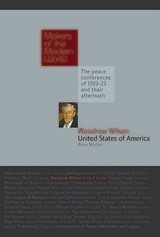
Woodrow Wilson
USA
Brian Morton
Haus Publishing, 2008
Woodrow Wilson (1856-1924). It is September 1919 - a meeting hall in a small mid-Western city. A thin man is speaking to a sceptical audience about peace. He has already met the city fathers and has been warned that 'out here' what happens in Europe means very little. Even the late war scarcely impinged on the place, though it had been recognised that it hadn't been altogether good for trade and one or two local boys had died on the fields of France in the very last days of the conflict. The speaker was obviously impassioned, with a preacher's cadence to his voice, and particularly so when he promoted the idea of an international League of Nations to guarantee future peace and ensure that the war into which America had been lured in 1917 really was 'a war to end all wars'. It is noticed that the man is sweating and pale and that he pauses frequently to dab his lips. The price of his campaign for peace - and peace conducted with principle - seems to be a terrible struggle between strong belief on the one hand and failing reserves on the other. Woodrow Wilson will live for another five years, but his battle to convince America to join the League is lost and much of the vigour that marked his time as President of his country, as president of Princeton University, even as an enthusiastic college football coach, was left behind in the Hall of Mirrors at Versailles. This book will look at the life of Wilson, from his early years during the American Civil War, through his academic and political career and America's involvement in the First World War, to Wilson's role at Versailles, including the construction of his Fourteen Points, his principles for the reformation of Europe, and the consequences of Versailles for America and on later conflicts.
[more]
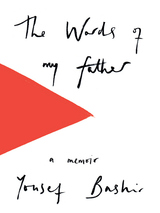
The Words of My Father
A Memoir
Yousef Bashir
Haus Publishing, 2018
In the Gaza Strip, growing up on land owned by his family for centuries, eleven-year-old Yousef is preoccupied by video games, school pranks, and meeting his father’s impossibly high standards. Everything changes when the Second Intifada erupts and soldiers occupy the family home. Yousef’s father refuses to flee and risk losing the house forever, so the army keeps the family in a state of virtual imprisonment. Yousef struggles to understand how his father can be so committed to peaceful co-existence that he welcomes the occupying Israeli soldiers as ‘guests’, even in the face of unfair and humiliating treatment. Over time, Yousef learns how to endure his new life in captivity – but he can’t anticipate that a bullet is about to transform his future in an instant. Shot by an Israeli soldier at the age of fifteen, and taken to hospital in Tel Aviv, Yousef slowly and painstakingly confronts the paralysis of his lower body. Under the ceaseless care of Israeli medical professionals, he gains a new perspective on the value of co-existence. These transformative experiences set Yousef on a difficult new path that leads him to learn to embody his father’s philosophy, and spread a message of co-existence in a world of deep-set sectarianism. The Words of My Father is a moving coming-of-age story about survival, tolerance and hope.
[more]
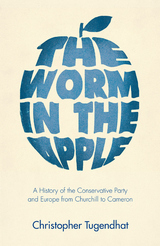
The Worm in the Apple
A History of the Conservative Party and Europe from Churchill to Cameron
Christopher Tugendhat
Haus Publishing, 2022
The first extensive history of the relationship between the UK Conservative Party and the European Union.
The Conservative Party has been in power for 47 of the 65 years since the end of World War II. During that time the division within the party over Europe has been the enduring drama of British politics—from Churchill’s decision not to join the original European Coal and Steel Community in 1951 to Cameron’s decision to hold the Brexit referendum in 2016. Other leaders came and went, but the issue was always there—sometimes center-stage, at others behind the scenes—destabilizing foreign policy, corroding the body politic, and destroying several of the party’s leaders. These questions, and how they panned out, created a deep, grumbling discontent—the worm in the apple—that, over time, turned the Conservative Party and, by extension, a significant section of the electorate, against British membership of the EU. By telling the story of the arguments and divisions within the Conservative Party, The Worm in the Apple helps to explain why Britain voted to leave the European Union in 2016.
The Conservative Party has been in power for 47 of the 65 years since the end of World War II. During that time the division within the party over Europe has been the enduring drama of British politics—from Churchill’s decision not to join the original European Coal and Steel Community in 1951 to Cameron’s decision to hold the Brexit referendum in 2016. Other leaders came and went, but the issue was always there—sometimes center-stage, at others behind the scenes—destabilizing foreign policy, corroding the body politic, and destroying several of the party’s leaders. These questions, and how they panned out, created a deep, grumbling discontent—the worm in the apple—that, over time, turned the Conservative Party and, by extension, a significant section of the electorate, against British membership of the EU. By telling the story of the arguments and divisions within the Conservative Party, The Worm in the Apple helps to explain why Britain voted to leave the European Union in 2016.
[more]
READERS
Browse our collection.
PUBLISHERS
See BiblioVault's publisher services.
STUDENT SERVICES
Files for college accessibility offices.
UChicago Accessibility Resources
home | accessibility | search | about | contact us
BiblioVault ® 2001 - 2024
The University of Chicago Press









